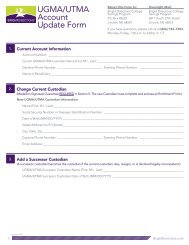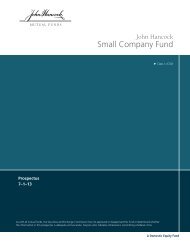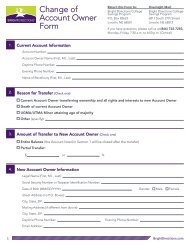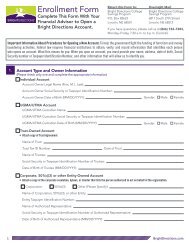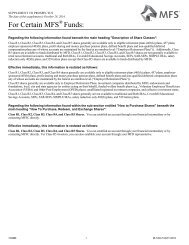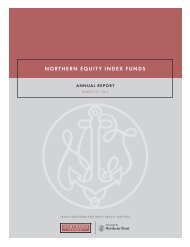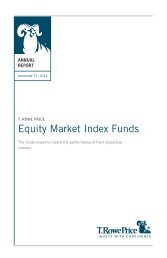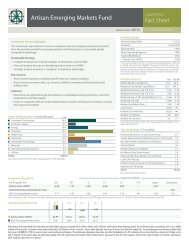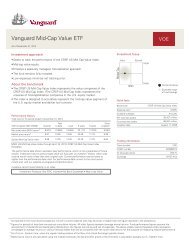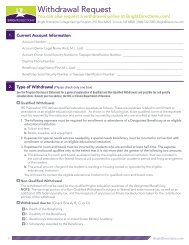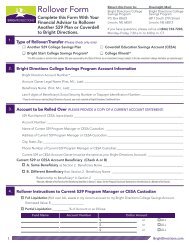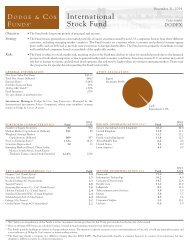Dodge & Cox Funds Statutoary Prospectus dated May 1, 2013
Dodge & Cox Funds Statutoary Prospectus dated May 1, 2013
Dodge & Cox Funds Statutoary Prospectus dated May 1, 2013
You also want an ePaper? Increase the reach of your titles
YUMPU automatically turns print PDFs into web optimized ePapers that Google loves.
fully reflect their fair value. The <strong>Funds</strong> have pricing andvaluation procedures that are intended to reduce thepotential for dilution and other adverse effects that canresult from pricing inefficiencies. Although the <strong>Funds</strong>’excessive trading policy and pricing and valuationprocedures are designed to prevent time zone arbitrage,there can be no assurances that such policies andprocedures will be completely effective. See Pricingof Shares.Trade Activity Monitoring The <strong>Funds</strong> monitorselected trades on a daily basis. Trade activity monitoringmay include:▪ Reviewing accounts where a purchase and sale occurswithin a short period of time;▪ Reviewing transaction amount thresholds; and▪ Making comparisons against the <strong>Funds</strong>’ “knownoffenders” database which contains information aboutinvestors who have violated the excessive trading policy.If the <strong>Funds</strong> determine that an investor has violatedthe excessive trading policy, the <strong>Funds</strong> will temporarily orpermanently restrict the account from subsequentpurchases (including purchases by exchange). Indetermining whether to take such actions, the <strong>Funds</strong> seekto act in a manner that is consistent with the bestinterests of Fund shareholders.Whether or not the excessive trading policy has beenviolated, the <strong>Funds</strong> may determine from the amount,frequency, or pattern of purchases and redemptions that ashareholder is engaged in excessive trading that is or couldbe detrimental to a Fund and its shareholders and thattrading restrictions are warranted. The <strong>Funds</strong> mayconsider the trading history of accounts under commonownership or control for the purpose of enforcing theexcessive trading policy. If a Fund believes that theexcessive trading may be for legitimate purposes, the Fundmay permit the investor to justify the activity.Transactions placed through the same financialintermediary on an omnibus basis may be deemed part of agroup for the purpose of this policy and may be rejected inwhole or in part by a Fund.The <strong>Funds</strong> or an authorized agent or sub-agent mayreject any purchase order (including exchange purchases)by any investor or group of investors indefinitely, with orwithout prior notice to the investor, for any reason,including, in particular, purchases that they believe areattributable to excessive traders or are otherwise excessiveor potentially disruptive to a Fund. Such purchase ordersmay be revoked or cancelled by a Fund on the nextbusiness day after receipt of the order.The implementation of the <strong>Funds</strong>’ excessive tradingpolicy involves judgments that are inherently subjectiveand involve some selectivity in their application. The<strong>Funds</strong>, however, seek to make judgments that areconsistent with the interests of the <strong>Funds</strong>’ shareholders.No matter how the <strong>Funds</strong> define excessive trading, otherpurchases and sales of Fund shares may have adverseeffects on the management of a Fund’s portfolio and itsperformance. Additionally, due to the complexity andsubjectivity involved in identifying excessive trading andthe volume of Fund shareholder transactions, there can beno guarantee that the <strong>Funds</strong> will be able to identifyviolations of the excessive trading policy or to reduce oreliminate all detrimental effects of excessive trading.Financial Intermediaries In general, it is the <strong>Funds</strong>’expectation that each Financial Intermediary will enforceeither the <strong>Funds</strong>’ or its own excessive trading policy. As ageneral matter, the <strong>Funds</strong> do not directly monitor thetrading activity of beneficial owners of the <strong>Funds</strong>’ shareswho hold those shares through third-party 401(k) andother group retirement plans and other omnibusarrangements maintained by Financial Intermediaries.Although the <strong>Funds</strong> have entered into informationsharing agreements with Financial Intermediaries, whichgive the <strong>Funds</strong> the ability to request information regardingthe trading activity of beneficial owners and to prohibitfurther purchases by beneficial owners who violate the<strong>Funds</strong>’ excessive trading policy, the ability of the <strong>Funds</strong> tomonitor, detect, and curtail excessive trading throughFinancial Intermediaries’ accounts may be limited, andthere is no guarantee that the <strong>Funds</strong> will be able toidentify shareholders who may have violated the <strong>Funds</strong>’excessive trading policy. Depending on the portion ofFund shares held through such Financial Intermediaries,excessive trading through Financial Intermediaries couldadversely affect Fund shareholders. Fund shareholders whoinvest through Financial Intermediaries should contactthe Financial Intermediary regarding its excessive tradingpolicies, which may impose different standards andconsequences for excessive trading.D ODGE & C OX F UNDS ▪ PAGE 49



